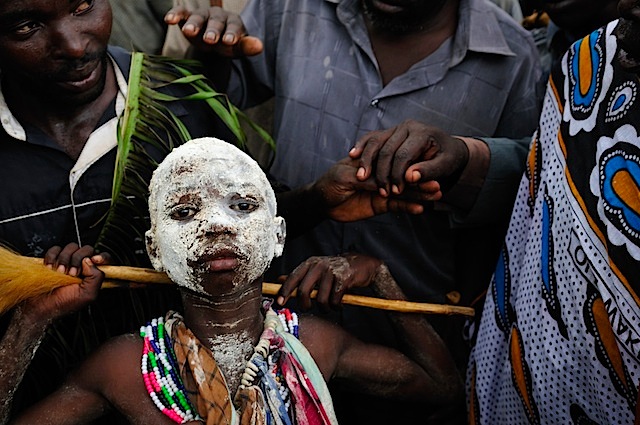The Imbalu circumcision – Uganda Ritual of Manhood Among the Bagisu

The imbalu is an annually practiced circumcision ceremony among the Bagishu in eastern Uganda. The Bagishu have their ancestral origins from Masaba who is believed to have emerged from the caves of Mount Elgon over 500 years ago. The imbalu is an old practiced ceremony that involves removing the foreskin of the male genital organ. The Bagishu themselves have no idea of when the initiation ceremony became part of their culture because some of them believe that it was adopted from the kalenjin at the western Kenya- Uganda border while other people believe that it was first done to punish an adulterous man.
Over the passed decades, the circumcision ceremony has become aright of passage for all Bagishu boys to manhood who believe that the desire to be circumcised is spiritually motivated. Before circumcision, boys first undergo preparation; they do the Isonja dance while strongly hitting hard their feet on the ground. This is usually done around March and June of the circumcision year and during this process, candidates to be circumcised are selected.
The circumcision ceremony is seasonal but when the season comes, the boys to be circumcised are first checked to see whether they are real Bagishu and are identified basing on their clans. During the circumcision process, the candidates are expected to stand firm as a sign of courage and boldness. They use a local herb called Itinyi to induce courage in those to be circumcised. They go to their relatives declaring their intentions of being circumcised and are later gathered at Mutoto- a cultural site where the first Mugishu was circumcised. Here elders lead those to be circumcised in traditional dances and songs.
They are then smeared with flour and put in the middle of a crowd dancing and singing Kadodi – a circumcision song played when circumcision is taking place.
The boys are then provided with sticks which they hold tight and look up to the sky and those in charge of circumcision then come to do their work. There are special trained Bagishu men who do the circumcision and always expect courageous boys not to scream and show any signs of fear. If that stick falls from the boys hands, he is considered a coward and often gets little ladies attention.
The Bagishu use a special knife in their circumcision process called Inyembe and the whole process takes about 10-30 seconds.
The whole circumcision process is concluded with the Inemba ceremony where the newly circumcised boys are allowed to put traditional men garments for the first time. The garments expose their muscular bodies especially during the inemba dance whose dance patterns express sexual messages. Boys at this stage are allowed to marry because it’s when they are considered men.
Some fear full Bagishu always flee the area however when they are traced and got, they are forcefully circumcised. If a man is not circumcised he is believed to be a coward and unclean and in typical Bagishu setting he is not allowed to marry a girl from the Gishu tribe. The Bagishu women have a habit of reporting their uncircumcised men who are later forcefully circumcised. The imbalu ceremony is very important among the Gishu culture and it’s now used as a means of unity since its one occasion that brings a large number of Bagishu together. The ceremony is also used as a means of identity and has played an important role in the preservation of the Gishu culture.
The imbalu now act as a tourist attraction because different travel to the region in order not to miss the mysterious ceremony and has been recently recognized as separate tour product by Uganda tourism board. Tourists visiting Mount Elgon national park therefore have a chance to experience the unforgettable unique Bagishu culture.
